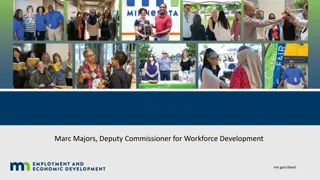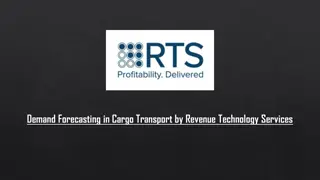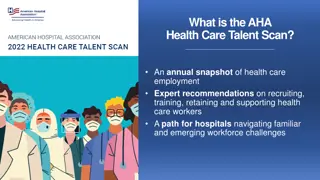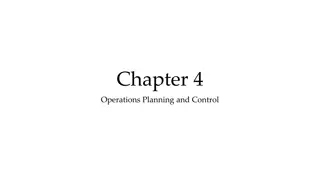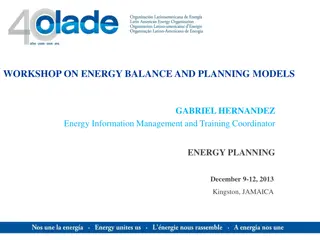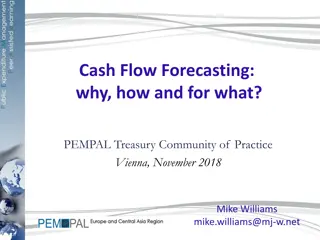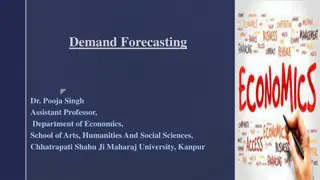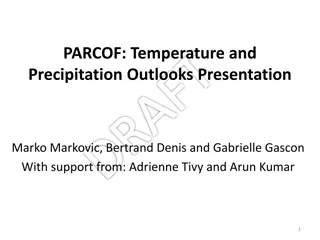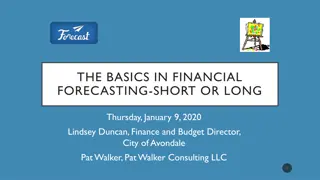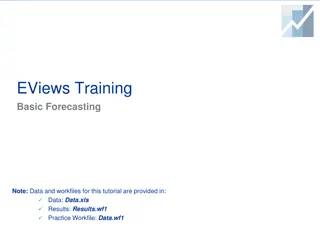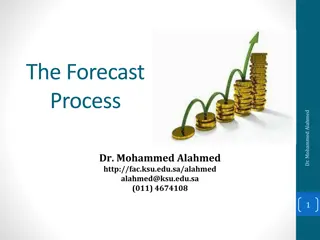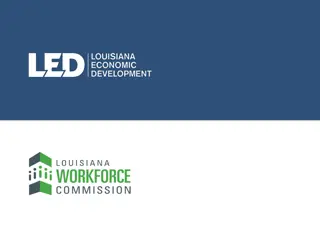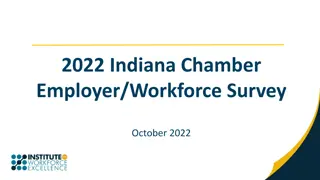Joint Action on Health Workforce Planning & Forecasting Work Package 7 - Sustainability Workshop Summary
In this workshop, various pieces of deliverables were discussed independently from technical developments. The main goals included collecting opinions, identifying decisions for the first release of WP7 products, and creating awareness among collaborating partners. Additionally, the workshop aimed to assess the coordination of technical experts, categorize their roles, and explore the importance of academic experts in the network. Key decisions were made to categorize technical experts and populate a comprehensive list based on stakeholder analysis. The workshop highlighted the need for networks to support policy-making at both EU and national levels.
Download Presentation

Please find below an Image/Link to download the presentation.
The content on the website is provided AS IS for your information and personal use only. It may not be sold, licensed, or shared on other websites without obtaining consent from the author.If you encounter any issues during the download, it is possible that the publisher has removed the file from their server.
You are allowed to download the files provided on this website for personal or commercial use, subject to the condition that they are used lawfully. All files are the property of their respective owners.
The content on the website is provided AS IS for your information and personal use only. It may not be sold, licensed, or shared on other websites without obtaining consent from the author.
E N D
Presentation Transcript
Joint Action on Health Workforce Planning & Forecasting Work Package 7 - Sustainability Work Package 7 Workshop Joint Action on Health Workforce Planning & Forecasting SUMMARY OF CONCLUSIONS Reporting : Prof. T. Kostadinova (MUV) & Eng. M. Van Hoegaerden (KUL)
Joint Action on Health Workforce Planning & Forecasting Work Package 7 - Sustainability Reminder : Goals of the Workshop Collect opinions on various pieces of deliverables independent from technical developments. Identify decisions for the first release of the WP7 products. Create awareness within the group of WP7 collaborating and associated partners.
Joint Action on Health Workforce Planning & Forecasting Work Package 7 - Sustainability Session 1 - Description of objectives Goal of the workshop Assess the overall identification and future coordination of the various (technical) experts Questions to be answered: MAIN: Considering the variety of experts on the different technical and knowledge aspects, are they to be categorized (and handled in a same or in different networks)? What are the goals of this/these technical networks now and in the future, and which profiles would be necessary? Is there a specific role for academic experts? SECONDARY: Do we have existing networks? How can we keep these networks alive?
Joint Action on Health Workforce Planning & Forecasting Work Package 7 - Sustainability Session 1 Technical Experts # Decision / Conclusion 1 We recognize a difference between technical & policy experts requesting difference in networking. 2 We recognize that the are between 4 and 6 types of technical experts the proposed subdivision, with some corrections, is a good start to propose categories for the first list of experts due to be delivered by March 2014. 3 We will populate the first list of experts with all the known experts participating in the J.A., but also with the experts highlighted by our major stakeholders. The Stakeholder analysis is a powerful tool to help us populate the second delivery of the list of experts. 4 The first matrix-like list of expert will match names with types of expertise as per #2, and additional columns highlighting the professions that are mastered by each expert.
Joint Action on Health Workforce Planning & Forecasting Work Package 7 - Sustainability Session 1 Technical Experts # Decision / Conclusion 5 We identified that whatever the shape of the network(s), one of its/their task is to provide support to policy makers network, helping policy being made at EU and at national level. 6 Considering the results of the workshop, we recognize that network(s) of technical experts are useful to address 2 more dimensions of needs: - Provide data / Evidence based evaluation of policy / Observatory role - Knowledge Management / Sharing & Internal Consultancy all through EU 7 We tend to recommend to have only one network of technical experts, with a strong management allowing each category to be addressed on its own topics on a regular base.
Joint Action on Health Workforce Planning & Forecasting Work Package 7 - Sustainability Session 2 - Description of objectives Goal of the workshop Define what sort of experts are needed for the sustainability Work Package (policy making) Questions to be answered: MAIN: Which government bodies are important for sustainability of health workforce planning and how do we identify the experts on policy making? How can the policy experts network created by the Joint Action articulate with the governmental official representatives? SECONDARY: How do we build further commitment while managing the differences?
Joint Action on Health Workforce Planning & Forecasting Work Package 7 - Sustainability Session 2 Policy Experts # Decision / Conclusion 1 It has been identified that the role of policy experts is to : - prepare/validate the recommendations of the JA - to follow-up the recommendations of the JA 2 The role (and mandate) of the EU Expert group on HWF and its relation with a potential network of policy expert should be analysed. 3 The usage of policy expert within WP7 is scheduled according to the phase of JA. (Focus on awareness, dissemination, decision making, implementation, ...) 4 The preferred ways of gathering a network of policy experts are also variable according to phase & goals: Platform type Conference, seminar type Policy dialogue type 5 Profiles can be helpful for organizations, government boards for identifying right delegates: commitment, expertise, power/influence/mandate
Joint Action on Health Workforce Planning & Forecasting Work Package 7 - Sustainability Session 3 - Description of objectives Goal of the workshop Define the sustainability of the WP5 and WP6 handout products Building up on knowledge management and knowledge transfer Questions to be answered: MAIN: How will the cookbook be updated after the pilot studies and in the future? How will the literature study be updated after its production? Are they extension to the foreseen documents to be planned?
Joint Action on Health Workforce Planning & Forecasting Work Package 7 - Sustainability Session 2 Policy Experts # Decision / Conclusion 6 It has been pointed out that for many participants there is no clear distinction between technical and policy experts and that roles are changing. (note: Michel Van Hoegaerden will produce a appendix based on HR theory and giving a easy definition of positions & roles) 7 It has been pointed out that even though there might be a difference in profile, a network would benefit from including both technical & policy experts. 8 It has been concluded that having a mandate is most important for policy experts.
Joint Action on Health Workforce Planning & Forecasting Work Package 7 - Sustainability Session 3 Tools # Decision / Conclusion 1 We identified a large number of activities to handle after the JA in all directions, so we collect items for the draft 1 delivery of WP7 in January to be upgraded by consultations. 2 We can artificially group those inputs into 3 big categories which we agreed to use as chapters for the first delivery: - Lessons learned (bigger focus 75% of the votes) - Extending the models up to Management Information Systems (25%) - Data collection and update implementation (0% of the votes) 3 We agreed on the process to switch in 2016 from the WP5 handbook to future developpement, with open source concept (to the usage of the network of experts) and the set up of a QA process 4 We know that the JA needs to focus on its task 5 We recongnize the need of very basic tools for the starting countries 6 We still have the expectation to evaluate fast after the basic level is implemented
Joint Action on Health Workforce Planning & Forecasting Work Package 7 - Sustainability Session 4 - Description of objectives Goal of the workshop Define the roll-out of the WP4, WP5 and WP6 product after the pilot studies Discuss how could we, all through EU & associated, share data and evaluate up to a good planning & forecasting level Questions to be answered: MAIN Considering the MATRIX study, are they next candidate countries for using the WP4, 5 & 6 products from scratch? What can countries that are already into planning learn from these cookbooks and further implement? SECONDARY What could be a realistic plan for roll-out and can it usefully be supported by EU
Joint Action on Health Workforce Planning & Forecasting Work Package 7 - Sustainability Session 4 Roll-Out # Decision / Conclusions 1 We identified the situations of 5 countries within 2 groups / - Planning countries (UK/BE) Main concerns: enhancing the models & keep track of yearly forecasting - Starting countries (IT/HU/BG) - Main concerns: Data collection & political support 2 It is impossible now to identify candidates for next basic migration because of the importance of Political decision, thought the level of readiness can be evaluated. 3 There are 2 trends the JA can work on: - Appropriate dissemination with highlight of financial impact and exemples - Update of overview data and further definitions of concepts and common standards 4 There is 1 trend to manage at EU level where severall topics were collected. Inclusion in a TOP DOWN approach is important to get political support and apply Name & Shame 5 We identified that the process that UK/BE went through took money but talso time. The JA will help cutting a lot of money, but time is still needed and can only be cut a little.
Joint Action on Health Workforce Planning & Forecasting Work Package 7 - Sustainability Session 5 - Description of objectives Goal of the workshop Collect the major message of the WP7 & WPL participants towards the future of Planning & Forecasting Questions to be answered: MAIN What are, the benefits/added value for continued European collaboration through a Joint Action to meet health workforce needs? How can JA influence and contribute to the development of European level comparable, accurate and good quality data for workforce planning purposes? Do participants have initial views on policy recommendations for the EU on top of the technical aspects within the final paper of the Joint Action? SECONDARY Are they some important known actions, currently out of scope of the Joint Action, which should be addressed in a future follow up Joint Action post 2016?
Joint Action on Health Workforce Planning & Forecasting Work Package 7 - Sustainability Session 5 Recommendations # Decision / Conclusion 1 We have to develop a sustainability strategy based on the Knoster model of change 2 We need to remind both internal and external dimension of the sustainability strategy 3 The JA network development in collaboration with other existing network is essential (Data / Expertise & Tools to be used for decision meeting) 4 Training and Mobility issues need political commitment (EU + bilateral) 5 Recruitment and Working Conditions issues need political commitment 6 Importance of dissemination of the JA recommendation also to Education, Labor & Social Affairs 7 We may develop a concept of virtual observatory
Joint Action on Health Workforce Planning & Forecasting Work Package 7 - Sustainability KNOSTER MODEL
Joint Action on Health Workforce Planning & Forecasting Work Package 7 - Sustainability What s next ? Planning up to the first draft of the WP7 deliverable
Joint Action on Health Workforce Planning & Forecasting Work Package 7 - Sustainability Next Steps September 9th/10th, first draft of sustainability plan to the WP Leaders September 13th, final sustainability plan to the members of the Executive Board By December, first draft of D072, D073 & D074 papers End of January, input through the conference & the Stakeholder forum February & March version 1 delivery of D072, D073 & D074 papers #3 Desk Research #2 Terms of approval of the dissemination & sustainability plans #4 Interviews Version 1 of D072, D073 & D074 #5 Output of conferences #1 This workshop February & March WP7 topic within the WP4 & WP6 Workshops
Joint Action on Health Workforce Planning & Forecasting Work Package 7 - Sustainability Thank you! All for attending the meeting and participating very actively To our co-chairs: Prof. Walter Sermeus Assoc. Prof. Plamen Dimitrov Milena Vladimirova To Margarita Tzoneva for the excellence in logistics And to the Bulgarian authorities for their support





